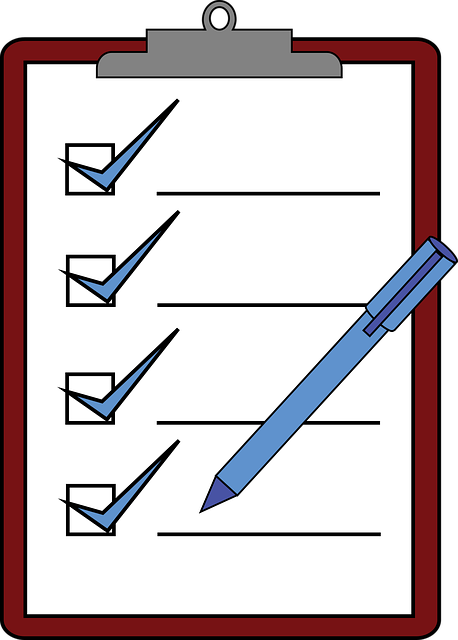
What does the GRE consist of? What subjects will you be tested on and what kinds of questions can you expect to see on the test? Knowing the GRE content, format, and question types is critical to doing well on the exam. Many people who don’t learn what they’ll be tested on end up studying the wrong skills and topics and, as a result, don’t get the GRE score they want.
Read this guide to learn the format of the GRE, what skills and subject areas you’ll be tested on, and every question type you’ll see on the test. We also include official sample questions so you can be as prepared as possible.
What’s the Format of the GRE?
The GRE lasts about 3 hours and 45 minutes and includes six sections. The first is always Analytical Writing, followed by (in any order) two Verbal Reasoning sections, two Quantitative Reasoning sections, and an unscored section used for research. For each Verbal Reasoning section, you will have 30 minutes to answer 20 multiple-choice questions, and for each Quantitative Reasoning section, you will have 35 minutes to answer 20 multiple choice and write-in questions.
The section that doesn’t count toward your score could either be a disguised (unmarked) experimental section testing questions for future GRE exams, or a clearly marked research section that may feature questions with different formats or on other topics. The experimental section will look just like one of the Verbal or Quantitative sections, can appear any time after the Analytical Writing section. You won’t be able to tell it apart from the sections that count, so take every section of the GRE seriously. On the other hand, the research section, if it appears, is always at the end of the test.
You’ll have a break after the third section, which is the halfway point of the exam.
| Section | # of Sections | Time | # of Questions per Section | Time per Question |
| Analytical Writing | 1 | 60 mins | 2 tasks | 30 mins |
| Verbal | 2 | 30 mins | 20 questions | 1 min 30 secs |
| Quantitative | 2 | 35 mins | 20 questions | 1 min 45 secs |
| Unscored Experimental or Research Section | 1 | 30-35 mins | 20 questions | 1 min 30-45 secs |
| Break* | 1 | 10 mins | — | — |
*The break comes after the third section.
Both the Verbal Reasoning and Quantitative Reasoning sections have score ranges of 130-170, in one-point increments. Analytical Writing has a score range of 0-6, in half-point increments.
Quick side note: we've created the world's leading online GRE prep program that adapts to you and your strengths and weaknesses. Not sure what to study? Confused by how to improve your score? We give you minute by minute guide.
You don't NEED a prep program to get a great GRE score. But we believe PrepScholar is the best GRE prep program available right now, especially if you find it hard to organize your study schedule and don't know what to study.
Click here to learn how you can improve your GRE score by 7 points, guaranteed.
What GRE Content and Skills Will You Be Tested On?
GRE content is designed so that it tests a wide variety of skills. In this section, we discuss the main skills tested in each of the three GRE sections so you know what GRE test components you should be studying.
Skills Tested in Analytical Writing
The Analytical Writing section tests your ability to write a clear and persuasive essay with supporting evidence, a logical flow, and technical accuracy (i.e., correct grammar, spelling, punctuation, and capitalization).
Your score will be based on your ability to:
- Understand the prompt/author’s position
- Develop a clear and logical argument
- Support your argument with relevant and compelling evidence
- Show a strong vocabulary
- Have variety in your sentences
- Have few/no errors in your writing
Skills Tested in Verbal Reasoning
Verbal Reasoning is designed to measure your ability to analyze passages, summarize main ideas, identify key points, and understand the meanings of words, sentences, and complete passages. About half the questions will test your vocab skills, and the other half will test your reading comprehension skills.
Skills Tested in Quantitative Reasoning
Most of the GRE Quant questions test concepts that you probably learned in high school or even middle school. The math itself isn’t that advanced, but, you will be tested on your critical thinking and problem-solving skills. The majority of Quant questions won’t require tons of number-crunching if you know how to approach them, but you’ll need to have solid foundational math skills.
Quant tests four main subjects: algebra, arithmetic, data analysis and geometry. Below is every math topic you can expect to be tested on.
Algebra:
-
- Expressions and equations
- Variables and constants
- Inequalities
- Functions
- Coordinate systems
- Coordinate geometry
- Lines and slopes
- Factorization
Arithmetic:
-
- Basic operations (addition, subtraction, multiplication, and division)
- Integers, fractions, and decimals
- PEMDAS (order of operations)
- Exponents and square roots
- Absolute values
- Prime numbers
- Even and odd numbers
- Percents and percent changes
- Sequences
- Ratios, proportions, and cross multiplication
Data Analysis:
-
- Distribution of data and frequency
- Graphical representations of data, including bar graphs, pie charts, scatterplots, time plots, and histograms
- Statistics, including mean (average), median, mode, and range
- Quartiles and percentiles
- Standard deviation
- Factorials, permutations, and combinations
- Probability
- Bell curve and normal distribution
Geometry:
-
- Lines, parallel lines, and perpendicular lines
- Relationships among angles
- Types of angles
- Polygons, including triangles, rectangles, squares, trapezoids, and parallelograms
- Special right triangles and the Pythagorean theorem
- Circles
- Arcs and sectors
- 3-D objects, including rectangular solids and right circular cylinders
- Perimeter, area, circumference, volume, and surface area
- Similar shapes
- Inscribed shapes

What Are the GRE Question Types?
This section goes over every question type you can expect to see on the GRE. We also include an official sample question for each type so you can get a better idea of what they look like/test you on.
Analytical Writing Question Types
The AWA section requires you to write two separate essays: “Analyze an Issue” and “Analyze an Argument.” While you can’t know which prompts you’ll receive on test day, you can access every issue and argument topic on the ETS website.
Analyze an Issue Essay
For the Analyze an Issue essay, you’ll choose one side of an issue and defend your stance with evidence and reasoning. Your opinion doesn’t need to be a full “agree” or “disagree” — you’re free to agree with certain parts of the issue and disagree with others so long as you explain why you are doing so in a clear and persuasive manner.
Your grade for this essay isn’t based on which side of the issue you choose but on how you construct your essay to effectively support your position. For more information, check out the full scoring guide for the issue task on the ETS website.
Here’s a sample Analyze an Issue prompt:
A nation should require all of its students to study the same national curriculum until they enter college. Write a response in which you discuss your views on the policy and explain your reasoning for the position you take. In developing and supporting your position, you should consider the possible consequences of implementing the policy and explain how these consequences shape your position.
Analyze an Argument Essay
For the Analyze an Argument essay, you’re not arguing your own opinion; you’re analyzing the logic and strength of a given argument. To effectively evaluate the argument, you’ll need to consider what kind of supporting evidence the author uses as well as if the author makes any weak or unfounded assumptions. The official scoring guide for the argument essay is available on the ETS website.
Here’s a sample Analyze an Argument prompt:
Arctic deer live on islands in Canada’s arctic regions. They search for food by moving over ice from island to island during the course of the year. Their habitat is limited to areas warm enough to sustain the plants on which they feed and cold enough, at least some of the year, for the ice to cover the sea separating the islands, allowing the deer to travel over it. Unfortunately, according to reports from local hunters, the deer populations are declining. Since these reports coincide with recent global warming trends that have caused the sea ice to melt, we can conclude that the purported decline in deer populations is the result of the deer’s being unable to follow their age-old migration patterns across the frozen sea. Write a response in which you discuss what specific evidence is needed to evaluate the argument and explain how the evidence would weaken or strengthen the argument.
Verbal Reasoning Question Types
The Verbal Reasoning sections consist of three types of questions. Ten questions focus on vocab and consist of two question types. The first is Text Completion questions, where you’ll pick appropriate words to fit into blank spaces left in a sentence. The other question type is Sentence Equivalence, where you’ll to find two synonymous words or phrases to complete a sentence. The other ten questions are Reading Comprehension questions. For these you’ll read passages and answer questions about information in the passage.
Text Completion Questions
For Text Completion questions you’ll select the correct vocab word to complete a sentence. Each Text Completion question contains one to five sentences with one to three blanks. Be aware that there is no partial credit if you get some blanks correct but others wrong. You’ll need to choose the correct vocab word for every blank in order to get points for the question.
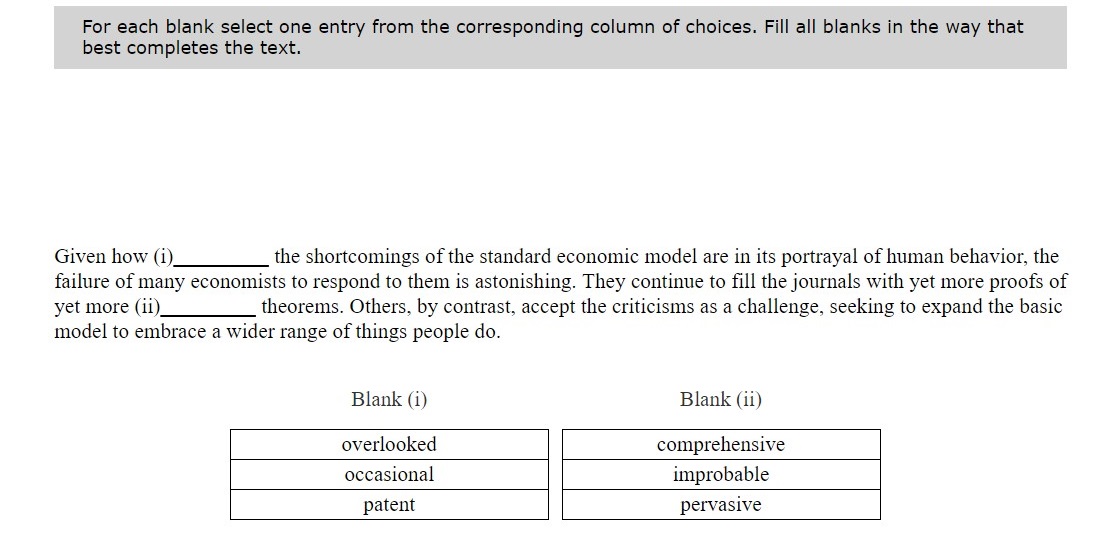
Sentence Equivalence Questions
Like Text Completion questions, Sentence Equivalence questions require a strong vocabulary, but for this question type you must choose two synonymous vocab words that, when substituted for the other, produce two sentences with identical meanings.
Want to improve your GRE score by 7 points? We have the industry's leading GRE prep program. Built by world-class instructors with 99th percentile GRE scores, the program learns your strengths and weaknesses through machine learning data science, then customizes your prep program to you so you get the most effective prep possible.
Try our 5-day full access trial for free:
To get credit for these questions, you must choose the correct answer for both blanks. Each Sentence Equivalence question has one sentence, one answer blank, and six possible answer choices.
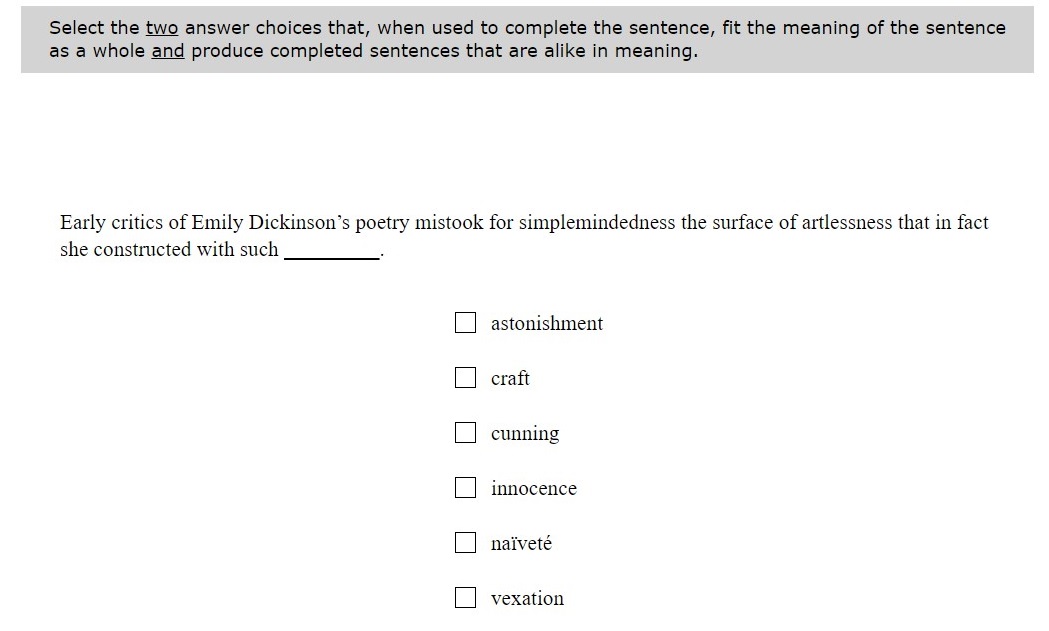
Reading Comprehension Questions
Reading Comprehension questions will include a passage and one or more questions about information in that passage. Most of the time you’ll choose one of five answer choices; other times, however, you’ll have to highlight a particular sentence in the passage or select multiple answer choices. To score highly on Reading Comprehension, you must be able to read and understand graduate-level texts.

Quantitative Reasoning Question Types
The Quantitative Reasoning section tests your skills in arithmetic, algebra, geometry, and data analysis. There are five types of Quant questions.
Quantitative Comparison
Quantitative Comparisons questions make up about a third of the Quant section, with seven or eight questions per section.
For these questions, you’ll compare two separate quantities (Quantity A and Quantity B). You’ll get a description and four answer choices:
-
-
-
- Quantity A is greater.
- Quantity B is greater.
- The two quantities are equal.
- The relationship cannot be determined from the information given.
-
-
Quantities may be equations, inequalities, integers, or diagrams.
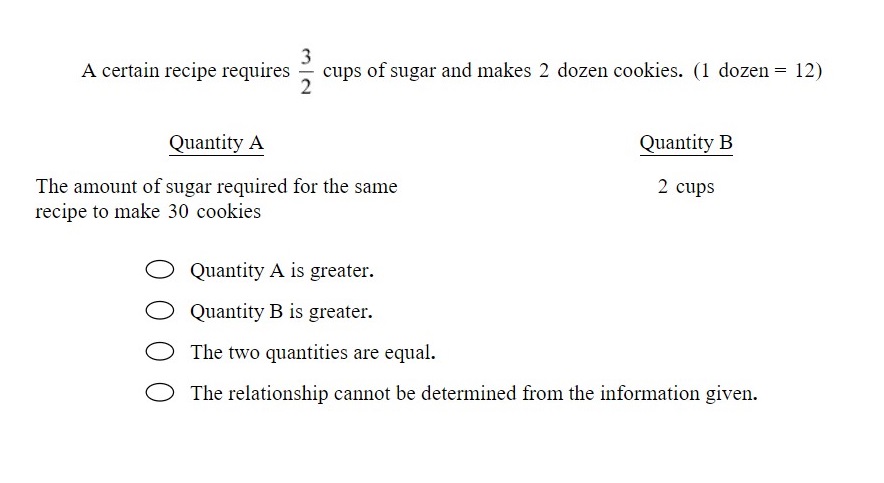
Multiple Choice (Select One Answer Choice)
These are basic multiple-choice questions, and each has five answer choices and one correct answer. They make up about half of the Quant section and cover a wide array of math topics, from probability to shapes to data interpretation. Each answer choice is accompanied by an oval (indicating that there is only one correct answer).
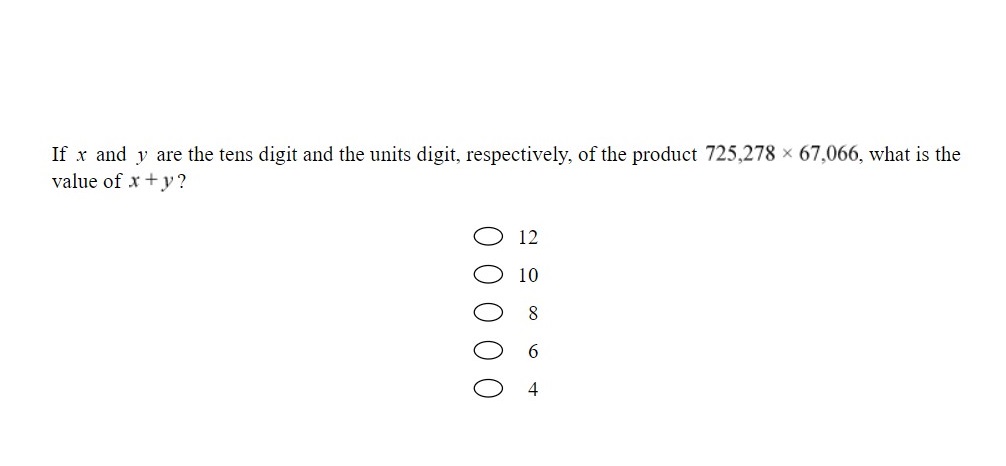
Multiple Choice (Select One or More Answer Choices)
You’ll be able to easily identify these questions because the answer choices are accompanied by squares next to them which indicates that you can choose more than one correct answer. Unlike single-answer multiple-choice questions, the number of answer choices often varies for multiple-answer questions. Some will offer five answer choices, some fewer than five, and some more than five. Additionally, these questions will ask you to select either a certain number of answer choices or all valid answer choices, so pay attention to the instructions.
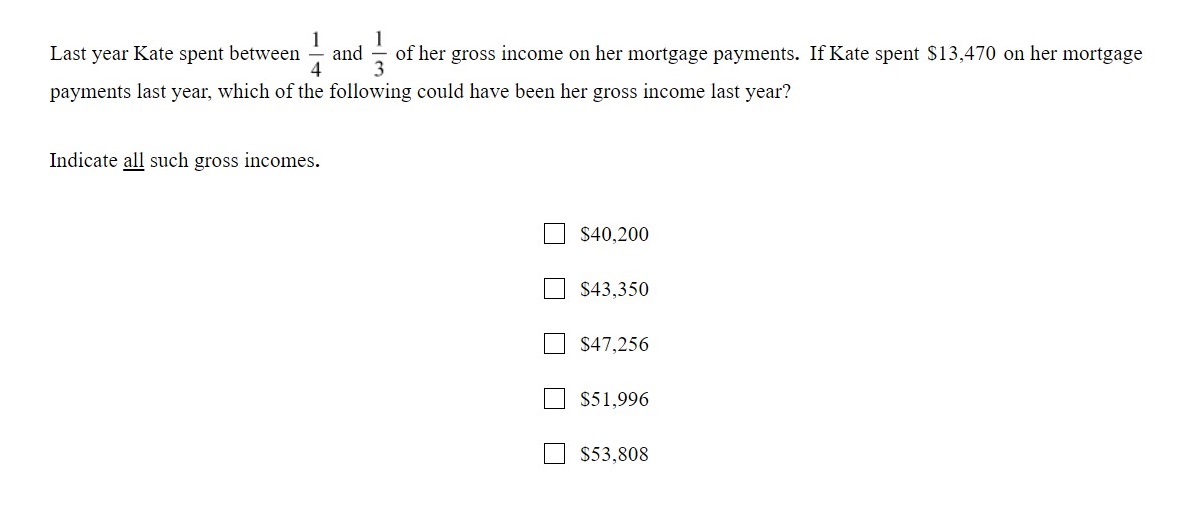
Numeric Entry
For Numeric Entry questions, instead of choosing the correct answer from a group of potential choices, you’ll type your answer into the provided blank. There are about two Numeric Entry questions per Quant section. Answers to these questions will always be integers, decimals, or fractions. If the answer is a fraction, the question will have two blank spaces – one for the numerator and one for the denominator.
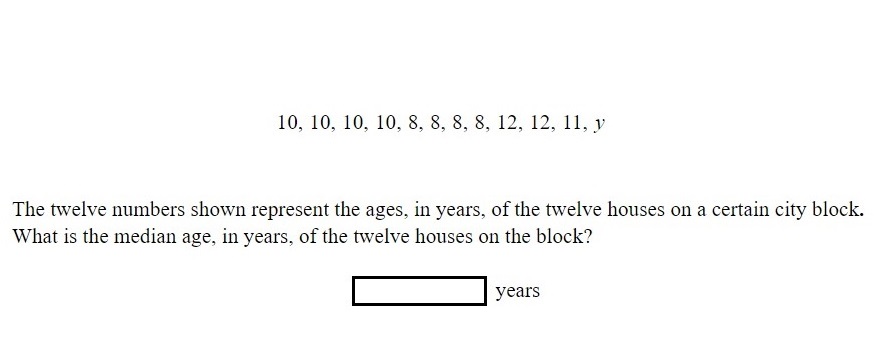
Data Interpretation
Data Interpretation questions refer to a specific set of data, such as a line graph or a table. You’ll see the visual(s) then answer about three questions in a row about different aspects of the data in those visuals. These questions can be either multiple-choice or numeric entry.
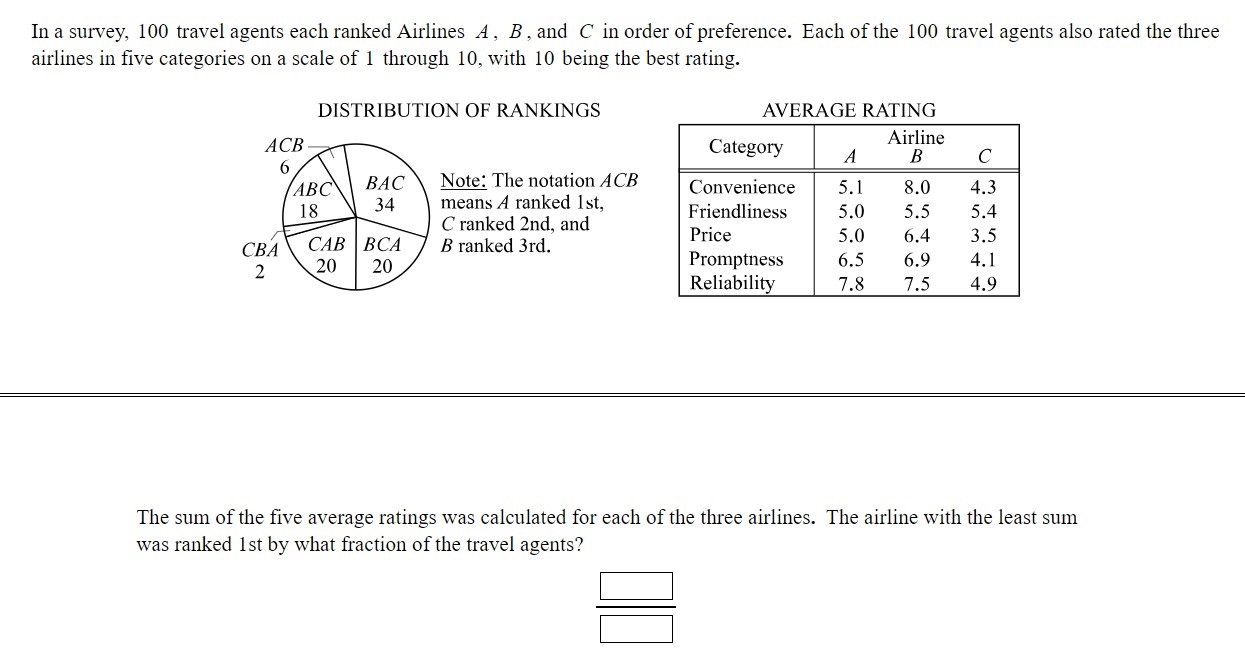
Summary: What Does the GRE Consist Of?
So, what does the GRE consist of? The GRE is a 3 hour and 45 minute long exam that includes three main sections: Analytical Writing, Verbal Reasoning, and Quantitative Reasoning. The GRE content you’ll be tested on ranges from writing skills, vocabulary, reading comprehension, and math questions focused on arithmetic, algebra, geometry, and data analysis. Knowing the GRE test components and what to expect from the exam will help you study the correct topics during your GRE prep and be more prepared on test day.
What’s Next?
What GRE score should you be aiming for? Check out our guide to what a good GRE score is and learn how to develop your own score goals.
Just how long should you study for the GRE? Learn exactly how many hours you should study for the GRE to get the score you want.
Want some quick study resources? Check out our guide to the 12 best GRE quizzes and get studying!
Ready to improve your GRE score by 7 points?
We've written a eBook about the top 5 strategies you must be using to have a shot at improving your GRE score.
Download it for free now:
